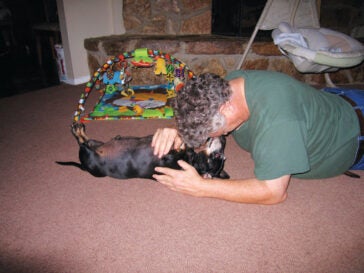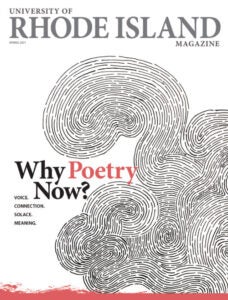From the Editor
In the last issue, we wished our outgoing president, David M. Dooley, farewell. URI is a better place today because of his tireless efforts. In this issue, we introduce you to our incoming president, Marc Parlange. We look forward to welcoming him and working with him as he takes the helm of our beloved University.
This issue is jam-packed with stories you shouldn’t miss. One of my favorites is Harrington School adjunct faculty member Betty Cotter’s essay about a school librarian, Roberta Sabella ’69, M.L.S. ’72. I share Cotter’s love for libraries, and URI has one of the best library and information studies programs around. Look for a story about URI’s alumni librarians, and learn why librarians are so important—today more than ever—in the fall issue of the magazine.
—Barbara Caron, Editor-in-Chief
For the Birds
I enjoyed reading “An Avian Affection” (spring 2021). I am pleased that URI invested in a strong ornithological program, as there was none when I was a grad student in zoology (1967–69). Professors Paton and McWilliams, and research assistant Charles Clarkson add wonderful dimensions—as does the Kingston Wildlife Research Station (not present in the ’60s). My M.S. in avian research (advised by a mammalogist!) at URI, followed by a Ph.D. at the University of Maryland, led me to a 35-year career in bird research at the USGS Patuxent Wildlife Research Center, then to the University of Virginia, where, as a research professor, I advised Charles Clarkson for his Ph.D. program. So now I enjoy two connections with URI.
—R. Michael Erwin, M.S. ’69
Thank You, URI
Compliments to everyone involved in bringing the University of Rhode Island Magazine to first-class publication status. I find it enjoyable and uplifting to read about the activities, academic accomplishments, research, and activism of faculty, students, and alumni—especially with such broad reach with national and international impact. It is amazing to see how URI has grown and developed through the years.
During my career as a civil engineer, I was fortunate to travel and work in the Caribbean, Europe, South America, Africa, western U.S., and Hawaii, with many wonderful and unique experiences for which I express gratitude to URI.
—Tom Pizza ’70

Honoring Heroic Women
My heart was warmed by “Redefining Nursing” (spring 2021) and the photo of Diane Healy Dexter ’50. My aunt, Annette Frisella ’52, is also a surviving member of that very first class. In her room, she keeps a photo (above) of the pinning ceremony for those brave young ladies. I believe there are 2 or 3 other feisty old ladies from that amazing class still kicking around, and who still send Christmas cards!
Annette would love to receive cards from any of her URI friends, especially those docs and nurses who knew her as “Jet.” Her address is Watson Fields, 201 Watson Rd., Dover, NH 03820. Or send email to me at tnjvdl@comcast.net. Thank you for publishing the article to honor heroic women from our past.
—Dr. Terri Vanderlinde
Missed Opportunity
Opening the spring 2021 issue, I was excited to see a lengthy article on the evolution of nursing. I work with nurses in hospitals and other facilities across Massachusetts, applying the journalism skills I learned at URI to help nurses communicate with each other and with the public.
The vast majority of nurses I talk to every day provide direct patient care, in places such as intensive care units, emergency departments, medical-surgical units, operating rooms, schools, home care settings and long-term care facilities. Their experiences, especially during the COVID-19 pandemic, can be harrowing, beautiful, and frustrating. These bedside nurses are powerful advocates for their patients and often speak passionately about modern challenges such as just-in-time staffing models that lead to unsafe patient assignments, workplace violence, and the closure of local services by large health-care systems.
I was surprised to see critical topics like these go uncovered in the article. It was a missed opportunity not to include more voices of frontline nurses.
—Joseph Markman ’08, Associate Director of Communications,
Massachusetts Nurses Association
Poetry Parody
Normally I read URI Magazine from front to back, article by article, in leisure moments over a month or two. But when the spring 2021 issue arrived and I saw the cover story, “Why Poetry Now?” I opened it immediately, turned to that, and read it. As a retired civil engineer who fancies himself a poet (with one book of poetry published), I found the article to be excellent—captivating and illuminating. Of interest was that Professor Jones taught Leigh Hunt’s “Jenny Kiss’d Me,” as I’ve written a parody of that piece, “Hunter Licked Me.” Best of luck to all the poets associated with URI.

Hunter Licked Me
Hunter licked me on the nose,
showing me his deep affection
Whimpering, this dachshund knows
who provides food and protection.
Tell me that my poems won’t sell.
that no muse has ever picked me.
Call me crazy, but then yell
“Hunter licked me.”
—David A. Todd ’74
The Richard Wilmarth Papers
I found the spring 2021 cover story “Why Poetry Now?” timely and timeless. URI has had faculty and students, past and present, who have cultivated an interest in poetry and writing. For example, the library’s Distinctive Collections houses the Richard Wilmarth Papers (B.A. ’88 M.A. ’91; M.F.A. Naropa University). Wilmarth was widely published by small presses and operated a literary small press that published a number of “post-beat” writers. The Richard Wilmarth Papers are another resource for URI students of poetry, literature, and cultural history.
—Arnold W. Peterson, M.A. ’86, M.S.L.I.S. ’95

What “Why Poetry Now?” Missed
In “Why Poetry Now?” (spring 2021), a glaring omission was any reference to the inspiring work by the late URI English professor Paul Petrie (1928–2012), who, for 30 years, shared his poems with students, staff, and community. Petrie’s work should have found its way to the recommended titles at the end of the piece. The story might have also mentioned the numerous poetry readings that took place on the URI campus from such Pulitzer Prize-winning poets as the late (Rhode Island-born) Galway Kinnell, Philip Levine, and Allen Ginsberg. Finally, there should have been a mention about the URI Library Special Collections department, which houses numerous first editions of important poetry, further demonstrating the University’s deep commitment to poetry.
—Robert Israel, M.A. ’76
Correction
With apologies to William Blake, we cited Blake’s poem “The Tyger” as “The Tiger” in the spring 2021 issue. Our sincere apologies for the error.
PHOTO: COURTESY URI SPECIAL COLLECTIONS
